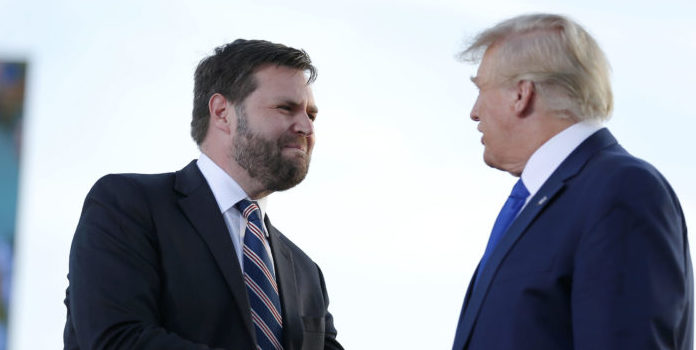(Headline USA) President Donald Trump has just started his second term, his last one permitted under the U.S. Constitution. But he’s already started making quips about serving a third one.
“Am I allowed to run again?” Trump joked during the House Republican retreat in Florida last month.
Whether teasing or taunting, it seems to be part of a pattern. Just a week after he won election last fall, Trump suggested in a meeting with House Republicans that he might want to stick around after his second term was over.
“I suspect I won’t be running again unless you say, ‘He’s so good we got to figure something else out,’” Trump said to laughs from the lawmakers.
Over the years, Trump and his supporters have often joked about him serving more than his two constitutionally permitted terms—an idea that is anathema to those afflicted with Trump Derangement Syndrome who have been desperate to drive the twice-impeached convicted felon out of office.
Of course there nothing wrong wanting one over another,it’s hating on the others,as they may end up the only one to beat Trump,if the blue candidate does not win, your choice will not have another chance next time as there will be no more asTrump says 4evapic.twitter.com/DiBeNoDw66
— illuminate (@myworldmysun) March 9, 2020
Joking aside, Trump has repeatedly said that this will be his last term. Trying for another also would flatly violate the Constitution.
“No person shall be elected to the office of the President more than twice,” begins the 22nd Amendment, adopted after President Franklin Delano Roosevelt was elected four times in a row. He was last elected in 1944.
Even assuming Trump would attempt another run, a combination of election officials and courts would virtually ensure that he stayed off the ballot.
State officials have long kept would-be candidates off presidential ballots if they didn’t meet the basic constitutional criteria, such as being a natural-born U.S. citizen or being at least 35 years old. They would do the same with someone clearly violating the limit on presidential terms.
A version of this unfolded in 2023, when blue-state officials and left-wing activists colluded to keep Trump off the ballot in several states by claiming he violated the 14th Amendment’s so-called Insurrection Clause.
The U.S. Supreme Court reversed those decisions, noting among other things that Trump had never been convicted of insurrection and that meddling in party primaries would have serious First Amendment implications.
While the issue largely hinged on how the courts legally interpreted “insurrection” and regarded Trump’s role in the Jan. 6, 2021, uprising at the U.S. Capitol, no such ambiguity would exist as to whether Trump met the existing eligibility requirements.
Derek Muller, a professor at Notre Dame Law School, said he would expect far more states to deny Trump’s placement on the ballot under those circumstances.
“You would not have the factual disputes, so it would be much wider,” Muller said. “I’m not persuaded the Supreme Court is going to roll over.”
Some Trump supporters argue the language is meant to apply only to two consecutive terms because Roosevelt’s terms were consecutive.
Others contend that because the ban is just on being “elected” more than twice, Trump could run as the next president’s vice president and, if the ticket won, could simply replace that person if he or she resigns.
But in both cases, the 22nd Amendment would likely still need to be modified.
At least one lawmaker in Congress, Rep. Andy Ogles, R-Tenn., has been bold enough to propose a constitutional amendment that would allow Trump to seek another term. However, it has no chance of going anywhere, given the high bar for amending the Constitution.
Trump has a long history of taunting his critics as a way of ridiculing the bogus left-wing narrative that he constitutes an existential “threat to democracy.”
Nonetheless, there could be a strategic reason for his keeping the third-term discussion alive as a way to disarm political adversaries who might attempt to exploit his term-limited “lame duck” status to undermine his ambitious four-year agenda.
“He’s governing like he’s a lame duck right now, with nothing to lose,” Muller said.
Or it might simply be a way to distract taillight chasing media, allowing potential successors—including Vice President JD Vance—the extra breathing room needed to make their case for succeeding him, free from the long shadow of his transformative legacy.
Adapted from reporting by the Associated Press

